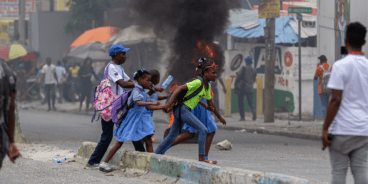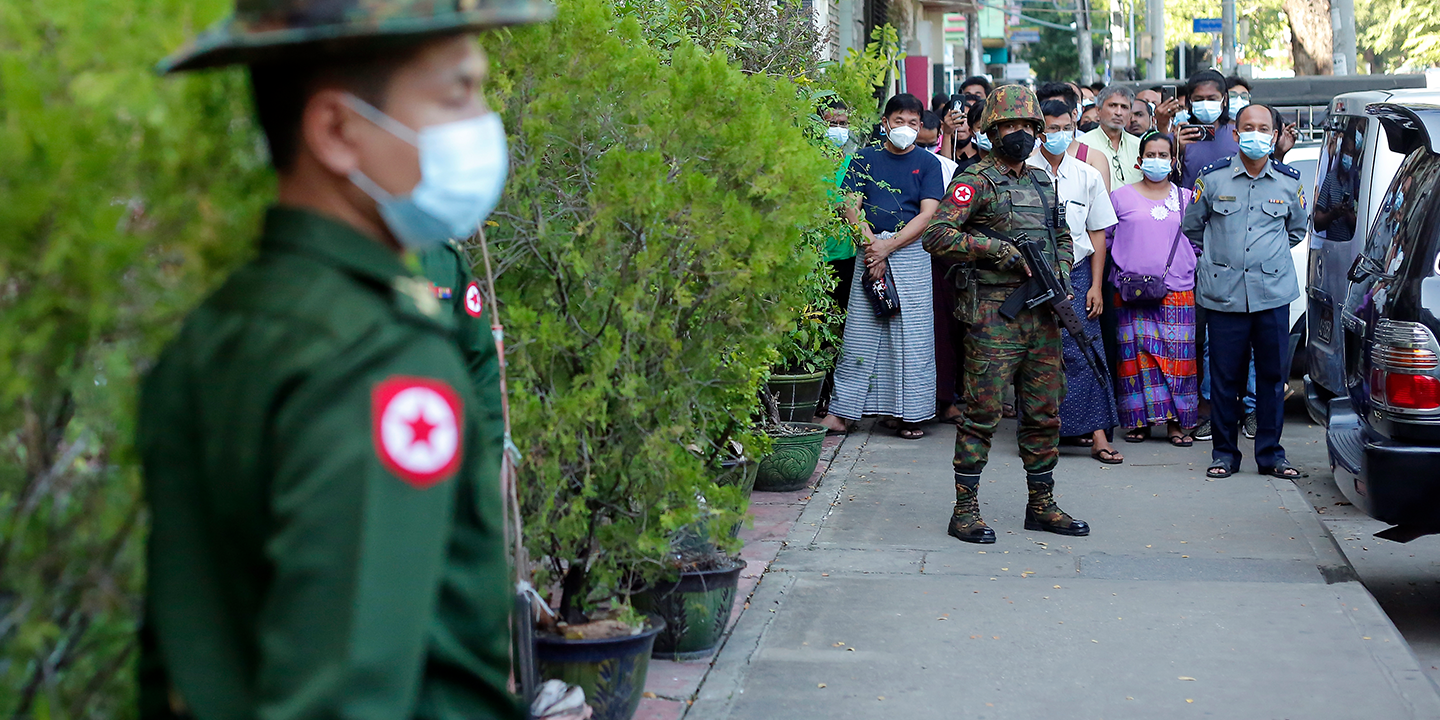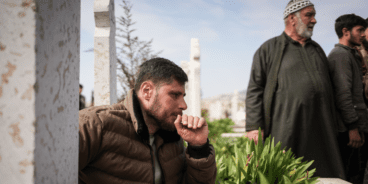

Atrocity Alert No. 238: Myanmar (Burma), Central African Republic and Sri Lanka
Atrocity Alert is a weekly publication by the Global Centre for the Responsibility to Protect highlighting situations where populations are at risk of, or are enduring, mass atrocity crimes.
Military coup in Myanmar poses imminent threat to all civilians
The situation in Myanmar (Burma) remains tense after the military – also known as the Tatmadaw – seized power in a coup early on Monday, 1 February. The military’s Commander-in-Chief, General Min Aung Hlaing, was placed in charge of the country. The coup began with the mass detention of various government officials from the National League for Democracy (NLD), including President U Win Myint, State Counsellor Aung San Suu Kyi and the chief ministers of all 14 states. The military have declared a state of emergency for a period of one year, with troops deployed in all of Myanmar’s main cities.
Myanmar’s armed forces previously ruled the country from 1962-2011, overseeing the violent repression of the democracy movement and waging war against several ethnic armed groups. Despite the beginning of a transition to civilian rule in 2011, the military retained control of significant ministries within the government, maintained 25 percent of seats in parliament, and controlled large sections of the economy. Although the NLD overwhelmingly won the 2015 elections, enabling Aung San Suu Kyi to become de facto leader of the government, the Tatmadaw continued to commit atrocities.
Myanmar is currently defending itself at the International Court of Justice against accusations of violating the Genocide Convention with regard to atrocities committed against the minority Rohingya population during “clearance operations” in Rakhine State during 2017. The UN’s Fact-Finding Mission on Myanmar has also accused the military of possible crimes against humanity and war crimes committed in Kachin, Rakhine and Shan states.
Monday’s coup was launched in response to the NLD’s victory in the November 2020 elections, where it comprehensively defeated military-backed candidates. The coup not only reverses progress made over the past decade, the reimposition of military rule poses a grave and imminent threat to all civilians across Myanmar.
In response to the coup, UN Secretary-General António Guterres has urged “the military leadership to respect the will of the people of Myanmar and adhere to democratic norms.” Meanwhile, the UN Special Rapporteur on the situation of human rights in Myanmar, Tom Andrews, said that, “decisive action is imperative, including the imposition of strong targeted sanctions, and an arms embargo.”
The UN Security Council held a closed meeting to discuss Myanmar on Tuesday, 2 February, but issued no formal statement or resolution. Dr. Simon Adams, Executive Director of the Global Centre for the Responsibility to Protect, has said that, “General Min Aung Hlaing rightfully belongs at the International Criminal Court for atrocities that were previously committed under his command. The entire international community should now impose an arms embargo and targeted sanctions on all senior Tatmadaw officers. Military-controlled economic entities should also be sanctioned. The climate of impunity and inaction that has emboldened Myanmar’s generals and led to the reimposition of military rule must end.”
‘Apocalyptic’ crisis marks 2nd anniversary of peace deal in the Central African Republic
On Saturday, 6 February, the Central African Republic (CAR) will mark the second anniversary of the signing of its “Political Agreement for Peace and Reconciliation.” Despite the agreement being hailed as a historic achievement, the anniversary will be overshadowed by renewed fighting. Former Prime Minister Martin Ziguélé described the current crisis in the country as “apocalyptic,” citing daily violence perpetrated by an alliance of predatory armed groups, the Coalition of Patriots for Change (CPC). Fighters from the CPC currently have the capital, Bangui, encircled.
Since the CPC launched their offensive against Bangui in December, 205,000 civilians have been forced to flee. According to the UN Refugee Agency (UNHCR), armed groups are also present at sites where displaced communities are sheltering in Batangafo and Bria, posing serious risks to vulnerable civilians. Reports indicate that some of these armed groups continue to forcibly recruit or attack civilians on the basis of religious or ethnic identity. Boris Cheshirkov, spokesman for UNHCR, warned that, “we hear about looting, sexual violence that is increasing rapidly and the situation is really worrying.”
During December the Human Rights Division of the UN peacekeeping mission in the Central African Republic (MINUSCA) documented numerous violations and abuses of human rights and international law, including killing civilians, sexual violence, torture, denial of humanitarian access and kidnappings. Armed groups who signed the 2019 peace agreement were responsible for 90 percent of these incidents. Many perpetrators of past atrocities also continue to hold command positions inside the CPC.
The peace agreement aimed to end more than five years of endemic armed conflict in CAR. However, this latest violence threatens to undo any tentative progress made towards stability. The UN Security Council must ensure that the CAR government and MINUSCA have the military capacity to defend Bangui and protect civilians from further attack.
Impunity for war crimes in Sri Lanka increases risk of recurrence
Last Wednesday, 27 January, the Office of the UN High Commissioner for Human Rights (OHCHR) warned that ongoing impunity for atrocities perpetrated during Sri Lanka’s 1983-2009 civil war has put the country on an “alarming path towards recurrence of grave human rights violations.”
The armed conflict between the government of Sri Lanka and the Liberation Tigers of Tamil Eelam (LTTE) armed group was marked by grave human rights violations and abuses, including extrajudicial killings, enforced disappearances and sexual violence perpetrated by both sides. From January 2009 onwards, Sri Lankan government forces intensified their military offensive against regions of the country held by the LTTE and both sides are alleged to have perpetrated war crimes and crimes against humanity. In May 2009 the last LTTE-held areas of the country fell and the government declared victory.
OHCHR’s latest report highlights negative trends that have “profoundly changed the environment for reconciliation, accountability and human rights” in Sri Lanka since the end of the civil war. This includes the appointment of individuals implicated in alleged war crimes and crimes against humanity to senior military positions, such as the Army Chief and Secretary to the Ministry of Defense. OHCHR also noted increasing marginalization of the country’s Tamil and Muslim minorities and divisive rhetoric from state officials.
Discrimination and violence targeting Muslims has accelerated since the April 2019 Easter Sunday terrorist attacks that claimed the lives of 277 people. Muslim communities have also sometimes been blamed for the spread of COVID-19.
Although the government initially supported some post-war accountability initiatives at the UN Human Rights Council (HRC) – including co-sponsoring several resolutions on “promoting reconciliation, accountability and human rights in Sri Lanka” – it failed to uphold its commitments. The government agreed to establish four transitional justice mechanisms, including a commission on truth, reconciliation and non-recurrence, and a judicial mechanism to investigate alleged violations of international humanitarian and human rights law. More than a decade since the end of the war, neither the commission nor the judicial mechanism have been established and the government has failed to prosecute state agents implicated in war crimes.
In support of the Sri Lanka report, the UN High Commissioner for Human Rights, Michelle Bachelet, said that, “it is time for international action to ensure justice for international crimes.” Bachelet called on states to pursue potential prosecutions under the principle of universal jurisdiction and to consider targeted sanctions against alleged perpetrators. OHCHR also called on the HRC to support the creation of an investigative mechanism to collect and preserve evidence of atrocities in Sri Lanka.
Related Content


Populations at Risk, March 2025
